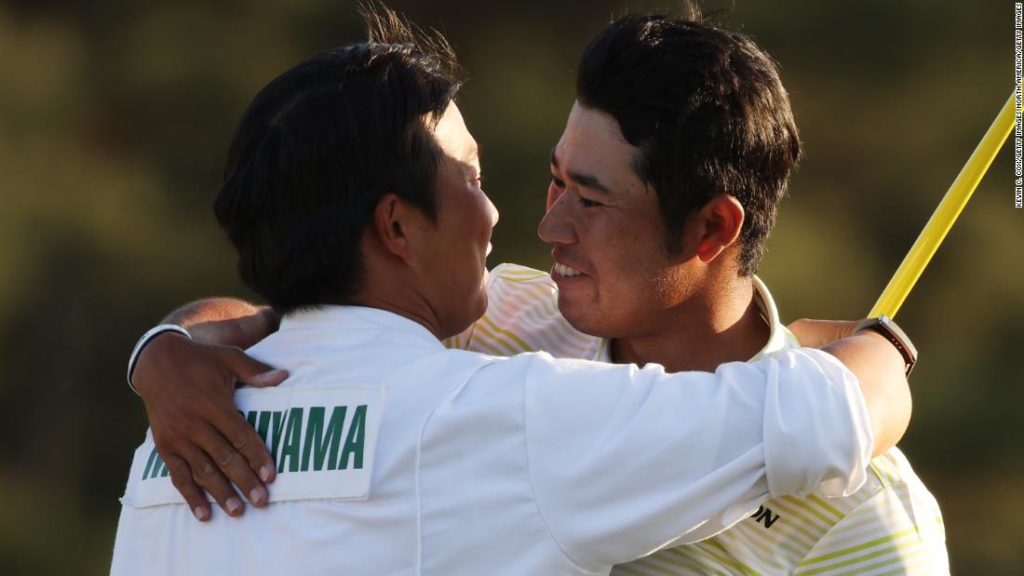“When the final putt went in, I really wasn’t thinking of anything,” Matsuyama told the media during his post-round press conference.
“But then hugging Xander [Schauffele] … when I saw my caddie, Shota and hugged him, I was happy for him because this is his first victory on the bag. And then it started sinking in — the joy of being a Masters champion.”
Having an impact back home
As he slipped on the Green Jacket and held the famous trophy, which depicts Augusta’s clubhouse, Matsuyama could begin to contemplate his win’s significance.
After four grueling days of inclement weather, blustery winds and tought opposition, the 29-year-old’s one-shot victory at the Masters ensured he’d become the first Japanese man to win a golf major.
Although others have come close before, the wait for a major champion has been long for a country with a rich sporting background.
So long that emotions got the better of Tokyo Broadcasting System’s (TBS) commentators. At the moment of Matsuyama’s victory, TBS announcer Wataru Ogasawara said: “Matsuyama won the Masters!” before tearing up and saying: “Finally, finally, Japanese has become the top of the world!”
Co-commentator Tsuneyuki Nakajima burst into tears and could not speak following the win.
Like Yu Darvish in baseball and Naomi Osaka in tennis before him, Matsuyama is hoping that his victory can bring a bright future for golf in Japan.
“I hope it will affect golf in Japan in a good way,” he said.
“Not only those who are golfers already, but hopefully the youngsters who are playing golf or thinking about playing golf, I hope they will see this victory and think it’s cool and try to follow in my footsteps.
“Up until now, we haven’t had a major champion in Japan, and maybe a lot of golfers or younger golfers, too, thought, well, maybe that’s an impossibility. But with me doing it, hopefully that will set an example for them that it is possible and that, if they set their mind to it, they can do it, too.”
‘If that’s the bar, then I’ve set it’
After his victory, in which he showed remarkable poise despite being on an almost four-year winless drought, Matsuyama thinks he’s raised the standard for his fellow Japanese golfers.
“I can’t say I’m the greatest [golfer in Japan’s history]. However, I’m the first to win a major, and if that’s the bar, then I’ve set it.”
With the Olympics coming to his homeland later this year, pressure will be on his shoulders to bring home the gold medal.
In the meantime there have already been calls for Matsuyama to light the Olympics Cauldron for the Summer Games, something he’d said would be a “great honor.”
After having some time to process his win, he’ll travel back to Japan with an additional green item of clothing in his suitcase.
The prospect of inspiring a new generation of golfer excites Matsuyama, although he warns that they’ll have to get past him if they want to win.
“But I still have a lot of years left, so they are going to have to compete against me still. But I’m happy for them because hopefully they will be able to follow in my footsteps.”
Mai Nishiyama and Chie Kobayashi contributed to this report.
You may also like
-
Super League: UEFA forced to drop disciplinary proceedings against remaining clubs
-
Simone Biles says she ‘should have quit way before Tokyo’
-
Kyrie Irving: NBA star the latest to withhold vaccination status
-
Roger Hunt: English football mourns death of Liverpool striker and World Cup winner
-
‘Every single time I lift the bar, I’m just lifting my country up’: Shiva Karout’s quest for powerlifting glory

